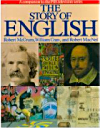

| Book of the Month | ||
 |
The Story of English |  |
Publisher: Viking Penguin
Authors: Robert McCrum, William Cran, Robert MacNeil
US$23.99
ISBN 0670-80467-33
This book is based on the Emmy award winning television series of the same name. It was broadcast on the BBC in Britain and on PBS (Public Broadcast Service) in North America. The book and series have been regarded as such a good summary of the development of English that both are often used in college and university courses. It helps a great deal that the writers have a fascinating story to tell. In about five hundred years a dialect spoken in one corner of the British Isles has grown to become the most widely spoken language on Earth with over a billion people who speak English as a first or second language. Yet this is not just a history of English, but also an attempt to analyze what it is that makes this particular language so special. It is clear from the start that the writers love words, and lovingly describe their origin and use at every chance they get.
The book has 384 pages, and because this is after all, an academic book, there is also a section of notes and sources and an index. Most of the book however, is divided into nine very readable chapters and an epilogue. The chapters have catchy titles such as 'A Muse of Fire' which are not very helpful in working out the contents. (In this case, Renaissance England and William Shakespeare.)In fact, after an explanatory opening chapter, the book is a mixture of the history of English, and its geography, as it examines how English spread around the world and how the different parts influenced each other. So, for example we have 'kayak' from the Nunavit ('Eskimos') and 'walkabout' from the Australian aboriginies. There are many illustrations, probably because the authors had them from the TV series. Most are not interesting, but the maps are fascinating - look for the one, for example showing the European language groups in early North America, and you can see why a settler might be sure that the language of the region was certain to be French or Spanish.
Who is this book for? An advanced student should have little difficulty in reading the material. However, it is of even greater use to his teacher who can give lessons with much greater authority by pointing out interesting facts about the background of certain phrases and the origin of words. Of course, anyone who is interested in English as a subject, and not just as a language to learn, should read this book. Although it will not help a great deal in learning English, it will explain why English is worth learning.
Verdict:For learning about English, not for learning English
Assessment 8/10